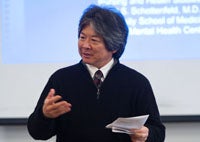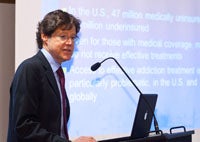A Novel Approach to Addiction Treatment

Posted in GUMC Stories
 Heroin addicts will seek treatment if the process is accessible, convenient, affordable, welcoming, and efficient, says Richard Schottenfeld, M.D., professor of psychiatry at Yale School of Medicine.
Heroin addicts will seek treatment if the process is accessible, convenient, affordable, welcoming, and efficient, says Richard Schottenfeld, M.D., professor of psychiatry at Yale School of Medicine.
“Treatments need to be adapted for heroin addicts to fit their particular local circumstances, culture, and customs,” the longtime drug addiction researcher said.
Schottenfeld came to campus Feb. 2, to deliver the McAuley Lecture for the School of Nursing & Health Studies.
Social Justice Advocate
NHS Dean Martin Y. Iguchi, Ph.D., introduced Schottenfeld.
“He really is an internationally renowned health researcher,” Iguchi said. “He is widely respected as a mentor. He is an incredible social justice advocate.”
When Schottenfeld began his work, he faced a common perception: “Addicts don’t want to change.”
That didn’t stop him. “I had a different dream,” he said.
Lessons from Amsterdam
 Schottenfeld pointed to Amsterdam, which had developed a methadone bus clinic.
Schottenfeld pointed to Amsterdam, which had developed a methadone bus clinic.
The effort increased the number of heroin addicts getting treatment from 15 percent to 90 percent.
“I think that’s proof of concept,” said Schottenfeld, who worked to establish more convenient and efficient treatment practices here in the United States.
In one project, the researcher helped incorporate addiction treatment into primary care settings – increasing the number of sites providing opioid maintenance therapy, facilitating access for addicts who were already in treatment for HIV, reducing stigma among treatment seekers, and involving more health care professionals in the process.
“It’s quite effective for people who stay in the treatment,” he said.
Work Abroad
Schottenfeld later extended his expertise internationally – helping to, for example, combat heroin usage in Malaysia.
Within the country’s population of 28 million, he said, about 500,000 people are heroin addicts. Intravenous drug use accounts for about 70 percent of the HIV/AIDS cases.
Methadone and buprenorphine – another addiction treatment drug – were prohibited until Schottenfeld and his team began a federally funded study there in 2001.
“I went there to help launch this new treatment,” he said.
The team discovered that buprenorphine, along with counseling, worked best for addicts in terms of treatment retention, drug abstention, and relapse delay.
Since he began working in Malaysia, access to treatment has increased, and the country has opened special clinics that meet the needs of addicts who are also HIV-positive.
“It’s been fun to work there because they have been receptive to making changes,” he said.
A Funded Series on Health
Schottenfeld spoke as part of the McAuley Lecture Series, a regular series on health topics made possible through a gift from Brian and Jane McAuley – parents of Georgetown graduates Beth (C’98), Mary (NHS’07), and Tricia (NHS’02).
“We really need to thank them frequently for this gift because it provides us with the opportunity to bring in some really great speakers,” said Iguchi, the school’s dean.
By Bill Cessato, NHS Communications
(Published February 8, 2012)
